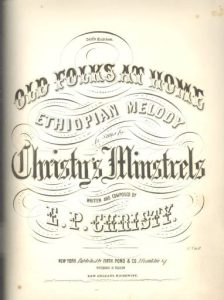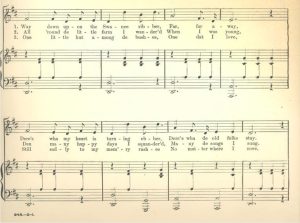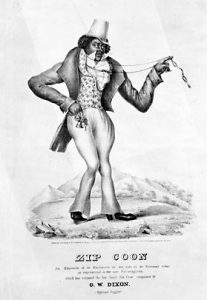In an earlier blog post, I came across Stephen Foster’s “Old folks at home” (also known as “Way down upon the Swanee River”), a ballad which was written for and widely performed by blackface minstrel troupes. Many of Foster’s compositions have had a prominent role in the lasting legacy of minstrelsy, and this piece is no exception. “Old folks at home” went from immediate popularity after its publication in 1851, to performances by Christine Nilsson and Adelina Patti, to designation as the state song of Florida in 1938. Through the Sheet Music Consortium database I was able to observe five different publications of the song ranging from 1851 to 1899.
The sheet music published by Firth, Pond & Co. in 1851 is unique because it claims that “Old folks at home” was composed by E. P. Christy, the leader of Christy’s Minstrels. Christy paid Foster to write the song and have it published under his name for performance by his minstrel troupe, as is made clear by the cover of the sheet music. The song is also labeled in this publication as an “Ethiopian melody”, which was interesting but not surprising, as white people at this time casually used “Ethiopian” to describe anything relating to dark-skinned people. 
The falsehood about Christy as the composer of this song must have been short-lived, because only three years later the song was published within “Foster’s Melodies Arranged for the Guitar”. All following publications that I have seen credit Foster as well.
Each publication which includes a vocal part used fairly similar dialect, although the dialectic inconsistencies present in some publications stood out to me. In the 1897 version published in Boston, the word “the” is used in the first line, but all other instances of “th” are replaced by “d.” 
In the 1894 “Concert Edition”, the word “ev’ry” appears in contrast with the word “ebber” used earlier in the same music. These inconsistencies reveal the half-ass nature of the use of dialect for this piece, which reflects the broader attitude of disrespect towards the group which is supposedly being represented in this music.

The Suwannee River in Florida, shown in red
“Old folks at home” is currently still the state song of Florida (due to its references to the Suwannee River), however, the most obviously problematic things about the song have been eliminated through the removal of dialect and the replacement of the word “darkies” with “brothers.” However, the line “still longing for the old plantation” continues to be clear and present in the first verse.
Based on letters from Stephen Foster to E. P. Christy, Foster wanted his “tragic” minstrel songs (such as “Old folks at home”) to inspire feelings of pity and compassion for slaves, rather than the ridicule resulting from most minstrel shows at the time. Could Foster’s intentions ever come true through this piece intended for blackface performance, which by nature mocks the experience of enslaved people in America? Only a further exploration of primary sources could tell.
Sources:
“Florida Lakes and Rivers Map.” GIS Geography. Geology.com, November 2, 2021. https://gisgeography.com/florida-lakes-rivers-map/.
“In Harmony: Sheet Music from Indiana.” Old folks at home. The Trustees of Indiana University, 2021. http://webapp1.dlib.indiana.edu/inharmony/detail.do?action=detail&fullItemID=%2Flilly%2Fdevincent%2FLL-SDV-035017.
“Old Folks at Home : Ethiopian Melody.” Playmakers Repertory Company Playbills. Accessed October 30, 2021. https://dc.lib.unc.edu/cdm/ref/collection/sheetmusic/id/37599.
“Old Folks at Home.” Playmakers Repertory Company Playbills. Accessed October 30, 2021. https://dc.lib.unc.edu/cdm/ref/collection/sheetmusic/id/37129.
“Old Folks at Home.” Playmakers Repertory Company Playbills. University of North Carolina at Chapel Hill. Accessed December 6, 2021. https://dc.lib.unc.edu/cdm/ref/collection/sheetmusic/id/32979.
“Old Folks at Home; Way down upon the Swanee River.” Duke Digital Collections. Accessed October 30, 2021. https://repository.duke.edu/dc/hasm/b0951.
“On This Day in Florida History – May 28, 1935 – Now Controversial ‘Old Folks at Home’ Becomes State Song.” Florida History Network – Your one-stop source for celebrating and preserving Florida’s past, today. Accessed December 6, 2021. http://www.floridahistorynetwork.com/may-28-1935—now-controversial-old-folks-at-home-becomes-state-song.html.
Root, Deane L. “Foster, Stephen C(ollins).” Grove Music Online, October 16, 2013. https://www.oxfordmusiconline.com/grovemusic/view/10.1093/gmo/9781561592630.001.0001/omo-9781561592630-e-1002252809?rskey=7S6WHZ#omo-9781561592630-e-1002252809-div1-5.
“The Swanee River.” State Symbols USA. State Symbols USA. Accessed December 6, 2021. https://statesymbolsusa.org/symbol-official-item/florida/state-song/swanee-river.




